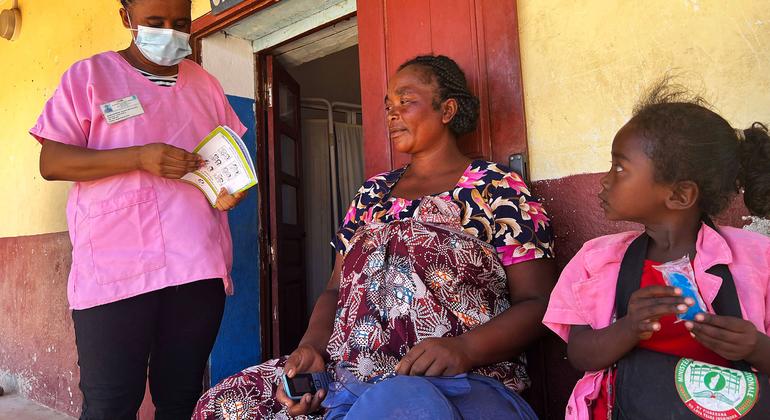The rural region of Androy in Madagascar has been facing a series of humanitarian crises that have particularly affected vulnerable populations, including pregnant women. However, the distribution of simple and affordable maternity kits is encouraging more women to access essential services to ensure the health of both themselves and their babies. Midwife Jeanne Bernadine Rasoanirina in Behara, Androy, highlighted the challenges faced in reaching the poorest women in the area, who may be hesitant to seek care due to financial constraints and a sense of shame associated with poverty.
Despite the obstacles, women who come to the health center in Behara receive free support for childbirth, thanks to the government and various UN agencies such as UNFPA, UNICEF, and WFP. These agencies provide crucial nutrition advice and support to complement the work of healthcare providers and promote the health of mothers and children. Jeanne expressed sadness at the sight of women who lack the means to care for themselves, often evidenced by their impoverished appearance and lack of knowledge about hygiene. Despite the challenges, there is a clear demand for maternal health services in the area, with Jeanne attending numerous antenatal and postnatal consultations.
The recent delivery of 240 maternity kits, supported by UNFPA, is expected to have a significant impact in encouraging more women to seek care at the health center. These kits contain essential items such as gloves, gauze, umbilical cord clips, and syringes for delivery, as well as clothing for the newborn. The provision of these kits can help alleviate the shame and barriers that prevent some women from accessing healthcare services. Jeanne emphasized the importance of consistent supply of these kits, noting that they can make a significant difference in promoting safe deliveries and reducing maternal and infant mortality rates.
In the context of south Madagascar, there are still cultural barriers that hinder safe childbirth practices, such as the belief that children are a sign of wealth even in families that lack the resources to care for them. Polygamy is common in the region, which can further complicate maternal and child health outcomes. Despite these challenges, efforts are being made to address these cultural norms and promote safe childbirth practices. The work of dedicated healthcare providers like Jeanne Bernadine Rasoanirina is crucial in ensuring that women in rural areas have access to quality maternal health services and the support they need during pregnancy and childbirth.
Overall, the distribution of maternity kits and the provision of free maternal health services in Androy are essential steps towards improving the health outcomes of mothers and babies in the region. By addressing financial barriers, promoting hygiene practices, and challenging cultural norms that impact maternal health, progress can be made in ensuring that all women have access to safe and dignified maternity care. Efforts to support midwives and healthcare providers in rural areas play a vital role in reducing maternal and infant mortality rates and promoting the well-being of families in vulnerable communities.









